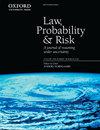法律的后果性与规范性分析
IF 1.4
4区 社会学
Q1 LAW
引用次数: 0
摘要
受阿尔夫•罗斯(Alf Ross)启发,人们有时会提出两种反对法律和经济学的观点。一是后果分析在法律科学中没有作用,法律科学的任务是预测法院判决。另一种观点是,涉及公平或社会福利的规范性标准毫无意义。我认为,前一种观点是对罗斯的误读,罗斯实际上呼吁发展法律和经济学。至于规范性标准,我赞成实用主义方法,即探究规范性概念是否会影响我们对法律规则或判决的可取性的看法。本文章由计算机程序翻译,如有差异,请以英文原文为准。
On Consequential and Normative Analysis of Law
Two views, inspired by Alf Ross, are sometimes raised against law and economics. One is that consequential analysis has no role in legal science, the task of which is to predict court verdicts. The other is that normative criteria involving fairness or social welfare are meaningless. I argue that the former view rests on a misreading of Ross, who in fact called for the development of law and economics. As for normative criteria, I argue in favor of a pragmatic approach, which inquires whether normative concepts can affect our views of the desirability of a legal rule or verdict.
求助全文
通过发布文献求助,成功后即可免费获取论文全文。
去求助
来源期刊

Law Probability & Risk
MATHEMATICSSTATISTICS & PROBABILITY&-STATISTICS & PROBABILITY
CiteScore
2.10
自引率
28.60%
发文量
8
期刊介绍:
Law, Probability & Risk is a fully refereed journal which publishes papers dealing with topics on the interface of law and probabilistic reasoning. These are interpreted broadly to include aspects relevant to the interpretation of scientific evidence, the assessment of uncertainty and the assessment of risk. The readership includes academic lawyers, mathematicians, statisticians and social scientists with interests in quantitative reasoning.
The primary objective of the journal is to cover issues in law, which have a scientific element, with an emphasis on statistical and probabilistic issues and the assessment of risk.
Examples of topics which may be covered include communications law, computers and the law, environmental law, law and medicine, regulatory law for science and technology, identification problems (such as DNA but including other materials), sampling issues (drugs, computer pornography, fraud), offender profiling, credit scoring, risk assessment, the role of statistics and probability in drafting legislation, the assessment of competing theories of evidence (possibly with a view to forming an optimal combination of them). In addition, a whole new area is emerging in the application of computers to medicine and other safety-critical areas. New legislation is required to define the responsibility of computer experts who develop software for tackling these safety-critical problems.
 求助内容:
求助内容: 应助结果提醒方式:
应助结果提醒方式:


